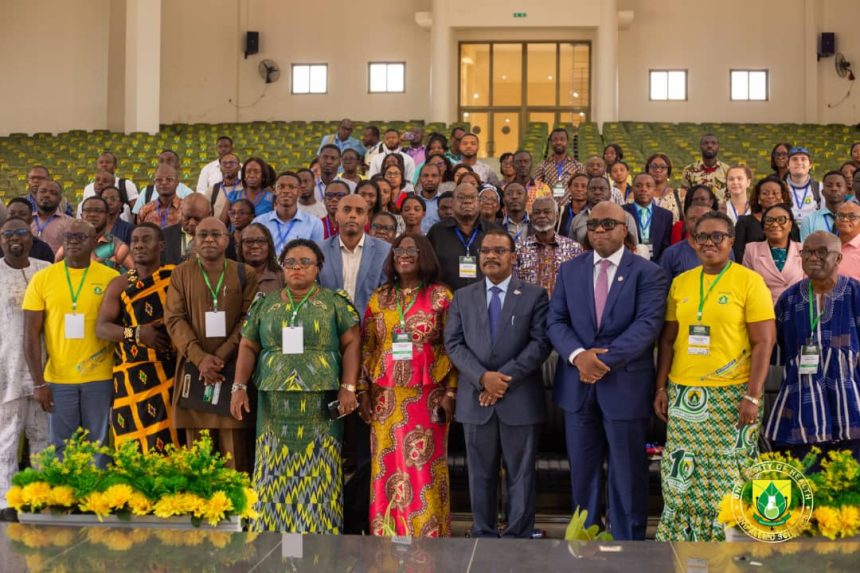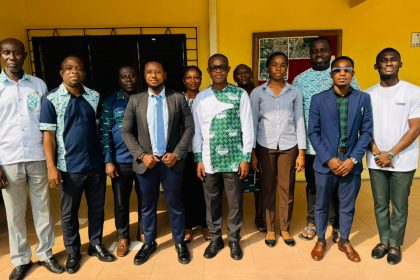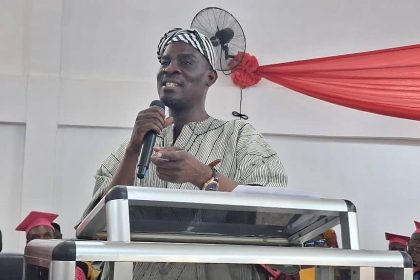Dr Michael Makanga, the Executive Director, Global Health European & Developing Countries Clinical Trials Partnership 3 (Global Health EDCTP3) is calling for an investment in resilient health systems in preparation for the next health crisis on the magnitude of the COVID 19 pandemic
This, he said, must go with the building capacity of researchers to stand up to the next pandemic and beyond.
Delivering the keynote address at the 2025 University of Heath and Allied Sciences (UHAS) Research Conference, Dr Makanga said: “Breakthroughs are powered by purpose. If an emerging threat hits tomorrow, we are ready to launch a trial within 30 days – ethically, safely and collaboratively.”
The three-day conference is under the theme: “Global Health Resilience Emerging Threats, Policy Impacts and Sustainable Solutions”.
The conference attracted participants from 11 other countries including Georgetown, Switzerland and UK.
Dr Makanga said the EDCTP platform is a unique European and African partnership working to improve health through research and development, “backed by the European Union and over 40 countries, we focus on infectious diseases that continue to harm millions across sub-Saharan Africa.”
He said: “We fund clinical trials and studies, train researchers, and strengthen the African clinical research ecosystem, ensuring that solutions are developed, where they are most needed and global health security is increased”
He added: “Global Health EDCTP3 is also contributing to boosting competitiveness, driving innovation, and supporting scientific excellence.
“The programme aligns with key policies such as Horizon Europe, the EU Global Health Strategy, the AU–EU Innovation Agenda, and the United Nations Sustainable Development Goal 3: ensuring healthy lives and wellbeing.”
Dr Makanga said the EDCTP project worth 443 million Euros for 111 projects and distributed across 64 countries has African countries receiving 276 million Euros with 36 projects with EU member states receiving 119 million Euros with 16 projects in the last four years .
It has “invested more than 3 billion Euros into capacity strengthening and research work in the last 21 years.”
He disclosed that their scope and integrated approach focuses on major infectious disease threats facing sub-Saharan Africa, tackling all stages of clinical evaluation but particularly late-stage studies with special focus on vulnerable population groups and unmet medical needs.
He said the future is the continue to strengthen the African clinical trials ecosystem, innovative clinical trial design, capacity development in all fields, digital innovations, ethics and regulation, community engagement, networks and financing.
Dr Makanga disclosed EDCTP has invested in the establishment of the Pan-African Clinical Trials Registry that is helping to map clinical trials that are conducted in Africa, which has become the first World Health Organisation (WHO) accredited clinical trials registry in Africa that is complementing clinical trials in the world.
Again, he said EDCTP has supported more than 600 clinical studies including more than 180 clinical trials that are in phases two and three and investing in genomic surveillance and epidemiology capacity and in regional networks of excellence and epidemic response consulting.
Dr Makanga enumerated some groundbreaking achievements to include appropriate HIV treatment for children, TriomuneBaby/Junior; patient-friendly medicine for acute sleeping sickness, Fexinidazone Winthrop; PyramaxR and CoatemR Baby for protection of children and women from malaria, Albendazole and Ivermectin for parasitic worm infections among others.
Dr Sofonias Asrat, Coordinator of Health Systems, WHO Ghana said resilience is not merely the capacity to respond to crisis but the ability to anticipate, absorb, adapt, and transform in the face of adversity with Ghana providing a powerful example of this commitment.
He said from the institutionalization, partnerships, to the digitalization of surveillance, Ghana has continually been an innovator to make its health systems more inclusive and short-lived.
Resilient systems are those that can produce on their own vaccines, manufacture essential medicines and sustain domestic financing hoping that all this could align perfectly with Ghana’s national health sector vision.
“As people innovate emerging trends, from antimicrobial resistance to micro-economy and climate change, let us all remember that health and resilience is ultimately among the people. Let us transform the upside from disconfidence into practice, scalable actions and make our systems not only stronger but also fairer,” Dr Asrat added.
Prof Lydia Aziato, Vice Chancellor of UHAS, emphasised the need for researchers and practitioners to collaborate and co-create interventions with the communities they serve, considering social, cultural, and spiritual factors.
GNA





